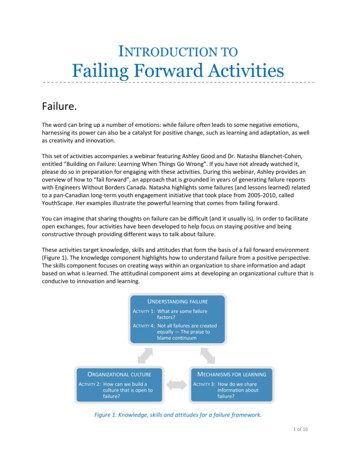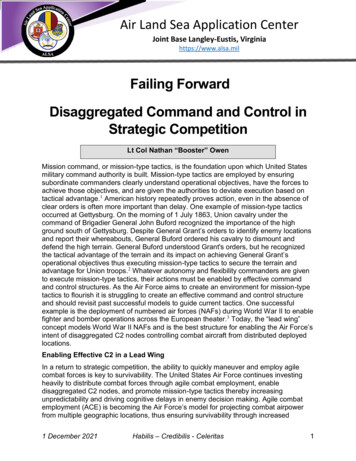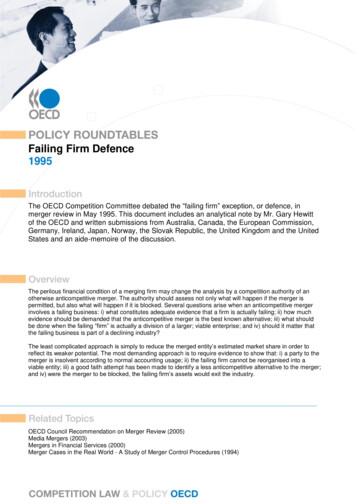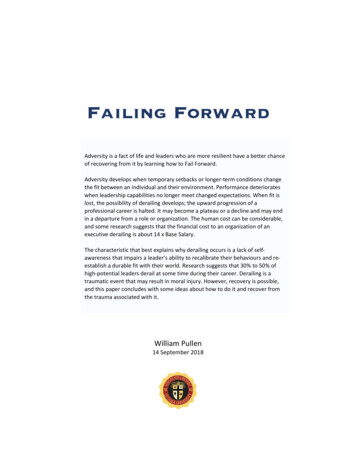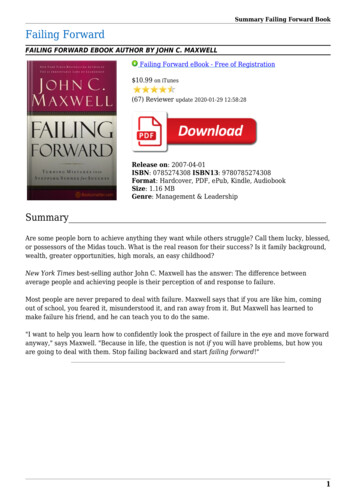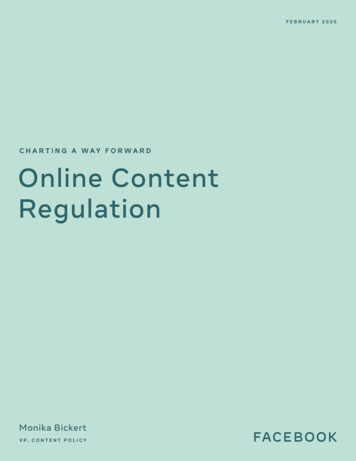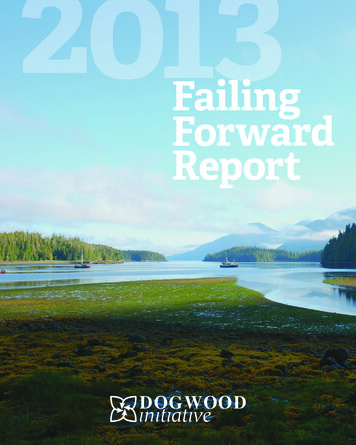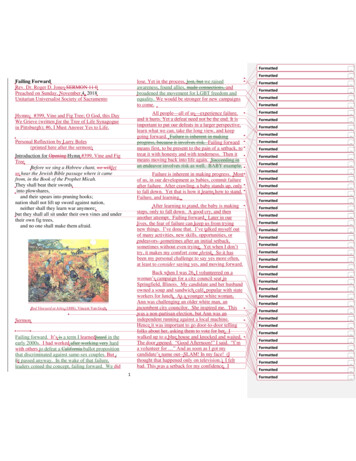
Transcription
Failing ForwardRev. Dr. Roger D. Jones SERMON 11 0Preached on Sunday, November 4, 2018Unitarian Universalist Society of SacramentoHymns: #399, Vine and Fig Tree; O God, this DayWe Grieve (written for the Tree of Life Synagoguein Pittsburgh); #6, I Must Answer Yes to Life.Personal Reflection by Larry Boles(printed here after the sermon)Introduction for Opening Hymn #399, Vine and FigTreeBefore we sing a Hebrew chant, we willletus hear the Jewish Bible passage where it camefrom, in the Book of the Prophet Micah.They shall beat their swordsinto plowshares,and their spears into pruning hooks;nation shall not lift up sword against nation,neither shall they learn war anymore;but they shall all sit under their own vines and undertheir own fig trees,and no one shall make them afraid.Formatted.Formatted.lose. Yet in the process, lost, but we raisedawareness, found allies, made connections, andbroadened the movement for LGBT freedom andequality. We would be stronger for new campaignsto come.Formatted.Formatted.Formatted.Formatted.All people—all of us—experience failure,and it hurts. Yet a defeat need not be the end. It isimportant to put our defeats in a larger perspective,learn what we can, take the long view, and keepgoing forward. Failure is inherent in makingprogress, because it involves risk. Failing forwardmeans first, to be present to the pain of a setback, totreat it with honesty and with tenderness. Then itmeans moving back into life again. Succeeding inan endeavor involves risk as well. BABY rmatted.Formatted.Formatted.Formatted.After learning to stand, the baby is makingsteps, only to fall down. A good cry, and thenanother attempt. Failing forward. Later in ourlives, the fear of failure can keep us from tryingnew things. I’ve done that. I’ve talked myself outof many activities, new skills, opportunities, orendeavors--sometimes after an initial setback,sometimes without even trying. Yet when I don’ttry, it makes my comfort zone shrink. So it hasbeen my personal challenge to say yes more often,at least to consider saying yes, and moving ck when I was 26, I volunteered on awoman’s campaign for a city council seat inSpringfield, Illinois. My candidate and her husbandowned a soup and sandwich café, popular with stateworkers for lunch. As a younger white woman,Ann was challenging an older white man, anincumbent city councilor. She inspired me. Thiswas a non-partisan election, but Ann was anindependent running against a local machine.Hence it was important to go door-to-door tellingfolks about her, asking them to vote for her. Iwalked up to a blue house and knocked and waited.The door opened. “Good Afternoon!” I said. “I’ma volunteer for ” And as soon as I got mycandidate’s name out--SLAM! In my face! (Ithought that happened only on television.) I feltbad. This was a setback for my confidence. .Failure is inherent in making progress. Mostof us, in our development as babies, commit failureafter failure. After crawling, a baby stands up, onlyto fall down. Yet that is how it learns how to stand.Failure, and learning.Red Vineyard at Arles (1888), Vincent Van GoghSermonFailing forward. It’s is a term I learnedheard in theearly 2000s. I had worked after working very hardwith others to defeat a California ballot propositionthat discriminated against same-sex couples. But .Iit passed anyway. In the wake of that failure,leaders coined the concept, failing forward. We did1
trudged on down the sidewalk, hurting. This waslong before cell phones, when you could callsomeone and get immediate support.is too limited. You know those ads for investmentfunds, touting their success? They must alwaysmake note: “Past fund performance fund is noguarantee of future success.” Turning that upsidedown, we could say, Current setbacks are noprediction of future performance.” This pictureprojected (and on your order of service) is The RedVineyard at Arles, by the Dutch painter VincentVan Gogh. You may be more familiar with hispainting Starry Night which appears on coffeemugs, mouse pads and Christmas cards. In 1890 hepainted the Portrait of Dr. Gachet, a homeopathicphysician with whom he stayed after a mentalhealth hospitalization. One hundred years later itsold for 82 million, at the time the highest price forany painting sold. Yet of all his great works, thepaining you see, The Red Vineyard at Arles, is theonly painting Van Gogh sold in his lifetime. It isnot fair to write off anyone as a failure. As weendure setbacks and then choose to go forward intolife again, we can be mindful and intentional aboutway we live and contribute to the world. We can bemindful that we will create a legacy. Yet we are notable to predict the course it will take.I passed a house with a yard sign promotingmy candidate. I went right up to their door andknocked. As I hoped, my arrival here was answeredwarmly. I told this person about the last door I’dknocked on. She said, “Ouch! That’s not verynice.” We talked and laughed a bit. We affirmedour enthusiasm for Ann.I needed reassurance after a setback—I wasreaching out to be reminded that I wasn’t alone. Iwasn’t working alone, wasn’t hoping alone. Then Igot back on the job. Ann lost anyway.I don’t know if she ran for office again. Idon’t know how she chose to fail forward. Yet forme, the success of her campaign was learning howto canvass neighborhoods. I learned that I could doit. The embodiment of democracy is talking topeople about the future of their community and theirpower to change it. Though it lost, her campaigntaught me that. I learned that I was not alone inworking to make things better, not alone in hoping.Sometimes hidden in an apparent failure is a gift, anunseen legacy for the benefit of others. That’sfailing forward.Most of us, in our development as babies,commit failure after failure. After crawling, a babystands up, only to fall down. Yet that is how theylearn how to stand. After standing, the baby ismaking steps, only to fall down. A good cry andthen another attempt. Failure after failure. Later inlife some of us become afraid of those failures andlet them keep us from trying new things. I’ve donethat—talked myself out of many activities,endeavors, hobbies, new skills. Yet when I do, itmakes my comfort zone feel smaller and smaller.When I learned to downhill ski in my early 30s, Ifell down a lot. But I got very good at pullingmyself back up. Much more practiced at it thanactually getting down the hill. In spite of mysuccess at getting up, my falls were too frequent andnot very fun, so I gave it up. I preferred to findingsafer ways to feel continually humbled.Every summer when I go home toIndianapolis, I make a pilgrimage to a smallmuseum and library known as the Kurt VonnegutMemorial Library. It promotes continuedengagement with the life and work of that greatIndiana-born writer of the late twentieth century.Years after his death, Vonnegut’s novels, articlesand short stories continue to be popular andimportant. Among other artifacts of his life you canview and read at the library is a framed item on thewall. Rotating every quarter, it shows one of themany rejection letters the author received frompublishers and magazines. Like so many creativepeople, he kept failing forward. In the SecondWorld War, he’d been through a horribleexperience, which put his minor defeats inperspective.Recently I saw a play entitled “Sweat” byLynn Nottage. All scenes take place around aneighborhood bar in Reading, Pennsylvania.Scenes take place in the years 2000 and 2008, withbrief TV news reports noting the decline inmanufacturing employment in the country, and thenthe financial collapse of 2008, with widespreadIt is not fair to write off anyone as a failure,including yourself or anyone else. No matter howdefeated we might feel, how disappointed in ourhopes or frustrated in our goals. It is not reasonableto make such a conclusion. Our single perspective2Formatted: Font: (Default) Times New Roman, 12 pt
mortgage defaults, homes lost, savings wiped out,and lives hurt. Regulars in this bar include threewomen who are coworkers at the local plant andgood friends. Their parents had worked at the plantbefore them, and now their young adult sons do.They are loyal to the company and loyal to oneanother. Then one friend, a woman of color, getspromoted to management after decades of standingon her feet. She wants to support her pals but whiteracial resentment poisons their friendship,especially when hard times hit. What seemed like areliable, solid source of income comes under threatas other companies lock out striking workers. Thentheir own plant ships machines out of the country.Addiction reaches out its claws. Resentment surgesin the next generation; their sons take out theirhelpless anger in a violent clash. This play is aboutfailure. The shame that seethe in the dialogue andthe pain that gets numbed with drugs are evidencethat the characters feel like failures. Even theirunion is overwhelmed and unable to provide morethan survival support. They want somebody toblame and they blame those nearest to them.Nobody in this drama can see that every life there isat the mercy of powerful forces and people muchlarger than their own efforts. We in the audienceknow from the TV in the corner as it spins briefreports of the larger catastrophes that befell thecountry and the world in the years while these folksgot up for work every morning and had a beer withfriends in the evening.Since defeat and hurt are inevitable inhuman life, one of the keys to getting through them/is not to go it alone. Reach out. And when othersneed it, reach out to them. Last Monday night I wasable to participate in an local interfaith service atCongregation B’Nai Israel in the Land Parkneighborhood. of solidarity Three days after withththee anti-Semitic massacre Jewish victims andsurvivors of the massacre in Pittsburgh, it was ashow of condolence and solidarity.Joining together at B’Nai Israel in the LandPark neighborhood, rabbisRabbis and cantors fromvarious congregations spoke and led songs andprayers. Public officials gave stirring and heartfeltremarks to a large crowd--s,the including Mayor ofSacramento Steinberg, Police Chief, two Hanh, andMmembers of Congress Ami Bera and DorisMatsuiand a State Senator. She recounted violentevents of the past, including when two white youngmen firebombed three Sacramento synagogues; theyalso firebombed a clinic that provided abortionservices and murdered a gay couple. Thecommunity came together then, she said, and atother times of assault on people and human values.And here we are again, she said.Formatted: Font: (Default) Times New Roman, 12 ptOne could think of those killings and firebombings as examples of a failure—not only afailure of our system and communities to cultivaterespect among people and peaceful disagreement. Italso was a failure of our hopes that U.S. Americanshad moved beyond anti-Semitic terrorism, a failureof the hope that ordinary people could worship inpeace, live in freedom, and express disagreementthrough the political process not violence. Yet herewe are again, Congresswoman Matsui said. Beforethat service began, Rabbi Mona Alfi, our host,invited e escorted all of the guest members of theclergy to a room behind the sanctuary. As 20 or 30of us stood in that quiet spaceShe, other Rabbis and,the Rabbi cantors thanked us for attending. Shethanked us and for the cards, flowers, and phonecalls of support their peoplethey had received sincethe Pittsburg shootings. Rabbis and cantors fromother congregations spoke of their deep thanks also.Formatted: Font: (Default) Times New Roman, 12 ptThen she told a story nearly She recalledtwo decades old. the 1999 fire-bombings of hersand two other temples. In 1999, two young whitemen firebombed three Jewish houses of worship inthe Sacramento area. They also firebombed aclinic that provided abortion services; later theymurdered a gay couple in a rural town. It would beunderstandable to think of those killings and firebombings as failures—not only the chosen failureof hateful men to threaten or take others’ lives andruin their own lives. But also, those crimesreflected a failure of our belief that Americans hadmoved beyond anti-Semitic terrorism, a failure ofour confidence that ordinary people could worshipin peace and express disagreement withoutviolence. Failure is a way to describe it.Formatted: Font: (Default) Times New Roman, 12 ptYet the Rabbi told us this:Yet out of thoseterrorizing events hadat event, she said, aariosen ashared response that changed the Sacramento area’sinterfaith community for the better. It brought usFormatted: Font: (Default) Times New Roman, 12 ptFormatted: Font: (Default) Times New Roman, 12 ptFormatted: Font: (Default) Times New Roman, 12 ptFormatted: Font: 12 ptFormatted: Font: (Default) Times New Roman, 12 ptFormatted: Font: (Default) Times New Roman, 12 ptFormatted: Font: (Default) Times New Roman, 12 ptFormatted: Font: (Default) Times New Roman, 12 ptFormatted: Space Before: 6 pt, After: 0 pt, Linespacing: singleFormatted: Font: (Default) Times New Roman, 12 ptFormattedFormatted: Font: (Default) Times New Roman, 12 ptFormatted: Font: (Default) Times New Roman, 12 ptFormatted: Font: (Default) Times New Roman, 12 ptFormatted: Font: (Default) Times New Roman, 12 ptFormatted: Font: (Default) Times New Roman, 12 ptFormatted: Font: (Default) Times New Roman, 12 ptFormatted: Font: (Default) Times New Roman, 12 ptFormatted: Font: (Default) Times New Roman, 12 ptFormatted: Font: (Default) Times New Roman, 12 ptFormatted: Font: (Default) Times New Roman, 12 ptFormattedFormatted: Font: ItalicFormatted: Font: (Default) Times New Roman, 12 ptFormatted: Font: (Default) Times New Roman, 12 ptFormatted: Font: (Default) Times New Roman, 12 ptFormatted: Font: (Default) Times New Roman, 12 ptFormatted: Font: (Default) Times New Roman, 12 ptFormatted: Font: (Default) Times New Roman, 12 ptFormatted: Font: (Default) Times New Roman, 12 ptFormatted: Font: (Default) Times New Roman, 12 ptFormatted: Font: (Default) Times New Roman, 12 ptFormatted: Font: (Default) Times New Roman, 12 ptFormatted: Font: (Default) Times New Roman, 12 ptFormatted: Font: (Default) Times New Roman, 12 pt3.Formatted: Font: (Default) Times New Roman, 12 pt.
together in an enduring spirit of support andcommon effort. . In 1999, thousands ofSacramento residents had come together to supportour Jewish neighbors in a large service at theCommunity Center Theater. It brought us togetherin a spirit of support across religious differences, aspirit that lives on today. If those 1999 crimes wereevidence the sign of a failure of hope or a failure ofthe system or a setback in our confidence, thecommunity’s response became a springboard formoving forward.Scenes alternate between the years 2000 and 2008.On the television over the bar, brief TV newsreports tell us the date and year of the scene, andillustrate the decline in manufacturing employmentin the United States and then the financial collapse.The regulars in this bar include goodfriends—women who are coworkers at a large localfactory. Their parents had worked at the plantbefore them, and now two of their young adult sonsdo so as well. The sons also frequent the bar. Thefather of one of the young men comes in, begginghis estranged wife and son for money. He’saddicted to drugs. But as he pesters them, he alsotries to warn them of looming failures, from forcesbigger than all of them. The dad’s company lockedout his union two years ago. And he’s gone fromdefiance, to desperation, to resignation. Yet thefriends in the tavern are loyal to their company andloyal to one another. Then one woman gets invitedto apply for promotion to a management office,after decades of standing on the shop floor. She’sAfrican American, as is her son. Her friends arewhite. She gets the promotion. As rumors oflayoffs rise, suspicion of her loyalty grows, andwhite racial resentment poisons the friendship.It was only two years later, in the wake ofthe September 11 terrorist attacks, that Jewish andother faith communities rallied in defense of ourMuslim neighbors, as anti-Muslim suspicions andhostility arose in this area and across the country.In addition, in those days local Sikh neighbors werefearing xenophobic violence as they grieved themurders of Sikhs who were targeted in other partsof the country. The community came together incondolence and in support. Rabbi Alfi cited theinterfaith community’s response as a turning point,the point of moving forward by reaching out.Perhaps, had all of Sacramento not been calledtogether in solidarity with the Jewish community,we would not have been quick or strong enough todefend our neighbors of Muslim, Sikh and otherfaiths from the Islamophobic suspicions andxenophobic violence that emerged after the terroristattacks of 9/11/2001. Indeed, two years ago thelargest mosque in Sacramento honored Rabbi Alfiewith recognition for leading the Jewish communityin support of interfaith neighbors.Their company ships machines out of thecountry in the middle of the night and closes part ofits operation. What seemed like a solid source ofwork—for life—is coming under threat. As theunion fights against the company’s plan to reducewages and cut more jobs, helplessness grows amongthe friends. So does resentment and anger. Theyoung men take out their anger in a physical fight,which has a tragic result. There’s much more tothis wonderful play, including enjoyable scenes andfunny characters. “Sweat” is a compassionate andrelevant play. It’s about failure.U.S. American culture is drenched withstories of personal success and personal defeat,images of heroic individuals and individual failures.How often have we heard another personcondemned as a “failure,” end of story? How oftenhas that word been a self-condemnation? Notexperiencing failure, but feeling like one? Such acondemnation is unreasonable and it’s isolating. Itkeeps us apart from one another.The characters want somebody to blame,and they blame those nearest to them. Nobody inthis drama can see that every one of them is at themercy of powerful forces much greater than any oneof them is. They desperately need—and lack— asocial analysis of their predicament, or an economicanalysis of their painful experience. Lacking alarger perspective, they look only at each other toexplain the failure going on around them. In theirsense of personal failure, they need a wider view ofwhat’s going on. The tragedy is that only those ofWithout learning or gaining a widerperspective on our experiences, our defeats canbecome toxic. This reminds me of a play I sawrecently at Capital Stage in Sacramento. It’s calledSweat, by Lynn Nottage. It’s set in a cozy tavern inthe manufacturing town of Reading, Pennsylvania.4Formatted: Font: 12 ptFormatted: Font: 12 ptFormatted: Space Before: 6 pt, After: 0 pt, Linespacing: singleFormatted: Font: (Default) Times New Roman, 12 ptFormatted: Font: 12 ptFormatted: Font: (Default) Times New Roman, 12 ptFormatted: Font: (Default) Times New Roman, 12 ptFormatted: Font: 12 ptFormatted: Font: 12 ptFormatted: Font: 12 ptFormatted: Font: 12 ptFormatted: Font: (Default) Times New Roman, 12 pt
us in the audience have this view, while they are ateach other’s throats. We all need a largerperspective.discomfort of loss, we can strive honestly to failure,not to avoid it, but to be present and open, gentleand, compassionate, gentle and open. More usefulthan having a magic n answer or a plan of escape, tobe open to listening is theis to be friendlyopen andkind thing to do.One way of describing failure in the wordsof Buddhist teacher and nun Pema Chodron, is“when things fall apart.” That’s the title of one ofher books. When we find that our well-worndefense mechanisms aren’t working, when we’re onthe edge of our fears, when we can’t talk our wayout of a situation or blame our way out of thediscomfort or anxiety we feel, that’s what shemeans by “when things fall apart.” Those momentsin life, or those moments in one day, areopportunities to see ourselves as we are, withhonesty but also with tenderness. She writes:“When the bottom falls out, and we can’t findanything to grasp, it hurts/ a lot.” Yet if we havethe courage to stay present through the hurt or fear,we can learn about ourselves. We can learn to begood friends with ourselves. Pema Chodon recallswhen things fell apart for her after she became amonastery’s new abbot. She found support by thewords of a visiting teacher: “When you have madegood friends with yourself, your situation will bemore friendly too.” (7)photo: Jason Blackeye, unsplash.comIf we have the courage to do stay present whenthings fall apart, she says, “we are going to becontinually humbled.” We are going to let go ofour assumptions, defenses, and the arrogance ofholding on to our ideas, over and over. This has todo with the courage to fail over and over. She callsit “the courage to die completely.”iPema Chodon recalls when things fell apart for herafter she became a monastery’s new abbot. Shefound support by the words of a visiting teacher:“When you have made good friends with yourself,your situation will be more friendly too.” (7).Formatted: Indent: First line: 0.5", Space Before: 6 pt,After: 0 pt, Line spacing: singleFormatted: Font: (Default) Times New Roman, 12 ptFormatted: Font: 9 ptThe little everyday version of failure iscalled frustration. This is failure’s every-daymanifestation. If we did not learn, adjust, and moveagain in a forward direction every day, we wouldn’tget anything done.Formatted: Font: (Default) Times New Roman, 12 ptThe relentless and irrational oversizedversion of failure is of failure, the sense that wehave not had a failure, but we are a failure. That’scalled, that’s called shame. . Shame is hard to betalked out of. It’s not reasonable, but it’s real.Healing It might call for professional therapy—it’swhich has been helpful for me in my life, I know. Itcertainly calls formight call for the self-reflectionthat comes from a spiritual practice or some anotherkind of disciplined discipline of reflection on ourattitudes, assumptions and our ways of reacting. Tobe sure, it And it calls for patience--showing toourselves, patience to another person. Receivingpatient acknowledgment from another. andkindness—to ourselves and to others.Formatted: Font: (Default) Times New Roman, 12 ptA close friend of mine lives across thecountry, and we talk often by phone. It seems thatshe and I take turns in rescuing each other from theunreasonable sense that we have become, once andfor all, a failure. Sometimes for me this happens ona Friday, sermon-writing day, when a blank page istaunting me to write. We talk it out.When failure, defeat or bad fortunefailure afflictsbefall us, what can give us comfort? When illfortune or failure befalls a personsomeone we wecare about, what should we do? When failure,defeat or bad fortune befall ourselves, what couldbe someone else’s caringis a helpful way torespond? and helpful response for us?Whethergiving support or asking for it, it is not very helpfulto try to Not to explain away the sense of loss orpain or to numb the pain. Rather than avoiding theFormattedFormatted: Space Before: 6 pt, Line spacing: singleFormatted.Formatted: Indent: First line: 0.5", Space Before: 6 pt,After: 0 pt, Line spacing: singleFormatted.Formatted: Font: (Default) Times New Roman, 12 ptFormatted: Space Before: 6 pt, After: 0 pt, Linespacing: singleFormatted.Formatted: Font: 12 ptFormatted.Formatted: Font: 12 ptFormatted: Space Before: 6 pt, Line spacing: singleOn other occasions, one of us might remindthe other what we appreciate about them. Myfriend, for example, has Tema Okun, a writer and5Formatted: Indent: First line: 0.5", Space Before: 6 pt,After: 0 pt, Line spacing: singleFormatted: Font: (Default) Times New Roman, 12 pt
anti-racism activist, says this is a reflection ofwhite-supremacy culture in the United States. Shemeans the toxic trait of perfectionism, the hypercritical attitude toward human imperfections in oneanother and ourselves. Too often we treat mistakesnot as occasions for improving but as reason forshaming another. In a culture and a country wherewhiteness has been the norm, it’s easy to think ofthese traits as ordinary for us, rather than as the paincaused by social structures of longstanding.iiBusiness Help Line. He gave me some advice: Ifyou want to start your own business, try working fora larger business first. Save money. Make yourearly mistakes at somebody else’s expense. Learnyour lessons on somebody else’s dime.Living and reacting out of fear may not increase theodds for future success. Escaping our pain won’tchange whatever didn’t work out. When thingsfall apart, Pema Chodron advises, rushing andracing ahead isn’t a good workaround. It’s not ahealing way forward.Several years ago a close friend was neckdeep in the waters of shame and failure, treadingwater but not getting anywhere and feeling prettybad. It seemed unreasonable to me—she had manyprofessional talents—personal and professionalones. Also, she is , was the devoted mother of twoadmirable children. She’s , and had gone throughfaced some scary life changes with courage andgone through them withand integrity. Returning thekindness, she tells me things I need to hear as well.Formatted: Font: (Default) Times New Roman, 12 ptFormatted: Font: (Default) Times New Roman, 12 ptFormatted: Indent: First line: 0.5", Space Before: 6 pt,After: 0 pt, Line spacing: singleFormatted: Font: 12 ptFormatted: Font: (Default) Times New Roman, 12 ptFormatted: Font: (Default) Times New Roman, 12 ptFormatted: Font: (Default) Times New Roman, 12 ptFormatted: Font: (Default) Times New Roman, 12 ptFormatted: Font: (Default) Times New Roman, 12 ptFormatted: Font: (Default) Times New Roman, 12 ptBeing present is key to failing forward.Whether suffering setbacks or painful defeats,moving forward into life is not about shiny success,but about intention, presence, compassion andcuriosity, and an openness to fear. Pema Chodronsays mindfulness means being honest with ourfeelings and present with ourselves in ourincompleteness. We can’t be a complete failure, foras individual human beings, we are never complete.Sometimes a kind reminder might involvehumor. Yet at this point she was feeling downagain, like a failure.Once when I was feeling down,she reminded me of a card I had sent her in themail, and how much it helped. I sent a her acard.All these years later, sShe still keeps ithandyhas it!. I don’t remember what I wrote insidethe note card, but on the cover it has the headline:Mistakes, over the word Mistakes, and a picture of asinking ship on the horizon of the sea. The captionuUnder the picture it says: “It could be that thepurpose of your life is only to serve as a warning toothers.”Amid the hundreds of election-related emails I’vereceived in the past several weeks was an inspiringone from Lin-Manuel Miranda. The creator andBroadway star of Hamilton didn’t write about anyone candidate but about moving forward in courage.He writes: “When we tell our children (andgrandchildren) the story of this moment, what willwe be able to say? Can we say, ‘I did all I could to turn us toward love, toward justice, towarddignity?”Perhaps this is the ultimate way to failforward—not merely learning from your mistakes, ormaybe not even learning from your mistakes, butletting others take their own lessons. Sometimeshumor is what we need to put our defeats inperspective, and try out a wider view, and keepgoing. Laughter can be a relief, opening us towardbeing able to say yes again, and go forward into lifeonce more. If we feel as if we are a sinking ship,maybe we should lighten up a little.When I was 25 I volunteered on the city councilcampaign in Springfield, Illinois. My candidatewas a younger white woman who co-owned a soupand sandwich restaurant popular with state workers.Ann was challenging an older white man, who wasthe incumbent. She inspired me, but she lost. Itwas a non-party election, but Ann was anindependent running against a local machine in aconservative town, so it was important to go doorto-door telling folks in that ward about her. At onewhite wooden house I rang the doorbell. The dooropened and I said Good Afternoon through thescreen door. “I’m a volunteer for ” And as soonas I said her name I got that proverbial slam of theMany years ago while in Business School Ihad a summer internship with an office of the U.S.Small Business Administration. One of my variedprojects brought me in contact with an old guy who’d worked in business and now staffed the SmallFormatted: Space Before: 6 pt, After: 0 pt, Linespacing: singleFormatted: Font: (Default) Times New Roman, 12 ptFormatted: Font: (Default) Times New Roman, 12 ptFormatted: Font: (Default) Times New Roman, 12 ptFormatted: Font: (Default) Times New Roman, 12 ptFormatted: Font: 12 ptFormatted: Font: (Default) Times New Roman, 12 ptFormatted: Font: (Default) Times New Roman, 12 pt,UnderlineFormatted: Font: (Default) Times New Roman, 12 ptFormatted: Font: (Default) Times New Roman, 12 ptFormatted: Font: (Default) Times New Roman, 12 pt,ItalicFormatted: Font: (Default) Times New Roman, 12 ptFormatted: Font: 12 ptFormatted: Font: (Default) Times New Roman, 12 ptFormatted: Font: 12 ptFormatted: Font: (Default) Times New Roman, 12 ptFormatted: Indent: First line: 0.5", Space Before: 6 pt,After: 0 pt, Line spacing: singleFormatted: Font: (Default) Times New Roman, 12 pt,ItalicFormatted: Font: (Default) Times New
Failing forward. It's is a term I learnedheard walked up to a in the early 2000s. I had worked after working very hard with others to defeat a California ballot proposition that discriminated against same-sex couples. But . Iit passed anyway. In the wake of that failure, leaders coined the concept, failing forward. We did lose.
